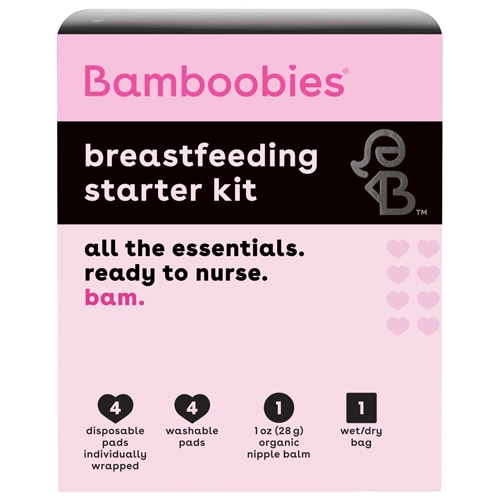[vc_row][vc_column][vc_column_text]Since the invention of baby formula in 1865, the question has often been, what’s best for a growing newborn: Breast milk or liquid infant food?
While it’s a profoundly personal matter—and one that can only be determined by you and your child’s healthcare professional—the benefits of breastfeeding are far-reaching and wide. Indeed, the American Academy of Pediatrics (AAP) suggests that newborns ought to breastfeed for the first six months of their lives before solid foods are woven into the mix, all the while continuing to nurse until one to two years of age.
Why?
Because from encouraging healthy weight gain to
naturally decreasing your risk of certain cancers, breastfeeding offers a host of advantages for both you and your child.
In honor of Breastfeeding Awareness Month, we’ve put this post together to give you the knowledge you need on the topic.

Read on as we dive into the leading benefits of breastfeeding, how to prepare yourself well for this most organic and beautiful of tasks, and other tips and tricks on
breastfeeding with
skill.
The benefits of breastfeeding for babies
The upside of breastfeeding for newborns runs the gamut from subtle to significant:
Provides proper—and complete—nutrition
Research demonstrates that breast milk is rich in several of the wholesome ingredients your baby requires for healthy growth. The proteins, fats, carbohydrates, vitamins, minerals and water inherent in breast milk are key to the successful development of your infant’s:
- Nervous system
- Immunity
- Gut bacteria
- Brain
…to say nothing of their other systems. Simultaneously, breast milk is kind on your baby’s tummy and intestines, helping to ensure their nutrients go down with ease.
Offers protection against myriad health conditions—and bolsters stronger health in general
The building of your baby’s defense against pathogens is critical, as an infant’s immune system isn’t completely developed at the time of their birth. This renders them prone to a slew of illnesses and infections, including bacterial skin infections—such as
cradle cap and eczema—and viral infections, like respiratory syncytial virus (RSV).
Given a newborn’s fragility, it’s imperative to keep them as well-shielded as possible—and breast milk assists enormously in this regard.
In fact, innumerable studies and medical experts show that, thanks to the antibodies found in breast milk—as well as the inclusion of proteins like secretory IgA and lactoferrin—it helps reduce an infant’s susceptibility to a score of potential health issues, including:
- Sudden Infant Death Syndrome (SIDS)
- Bacterial meningitis
- Ear infections
- Stomach problems, such as vomiting, diarrhea and necrotizing enterocolitis (NEC)—a condition in premature babies in which intestinal tissues die
- Respiratory infections, like whopping cough
What’s more, breastfed infants don’t just receive “insurance” against illnesses
as babies: Studies reveal that people who were breastfed as children have a lower risk of several health conditions later in life, such as:
- Childhood obesity
- Leukemia
- Diabetes
- Cavities
- Inflammatory bowel disease (IBD) and Celiac disease
Furthermore, breastfed babies tend to score higher on intelligence tests later in life—and there’s no doubt that
every parent wants their child to succeed.
Fosters emotional strength
Whether you’ve just had a child or have one on the way, you’re likely well-aware that infants are apt to express themselves in ways that may be… well, a tad challenging to handle at times. (Hello, eardrums.)
Luckily, breast milk has a wealth of substances that organically calm your baby. Meanwhile, the act of breastfeeding supports a lovely, healthy and necessary connection between you and your newborn, which is essential to your relationship—now and in the years that follow. This is due to the release of oxytocin, a hormone, often dubbed “the love hormone,” that has
a soothing effect on mothers as well.
The benefits of breastfeeding for mothers
As discussed, your baby isn’t the only one that profits from breastfeeding.
In addition to possibly helping you shed your “baby weight,” and serving as a cost-effective and convenient alternative to infant formula, breastfeeding offers several pluses for moms:
Supplies safeguarding against certain health conditions
A large body of research indicates that breastfeeding lowers your vulnerability to developing an array of issues—immediately and in the future. These include:
- Postpartum depression and anxiety
- Cardiovascular disease
- Specific cancers, including ovarian cancer, breast cancer, thyroid cancer and endometrial cancer
- Type 2 diabetes
- Osteoporosis
- High blood pressure
Encourages a swifter recovery following childbirth
Remember that “love hormone,” oxytocin?
Well, it does more than boost that vital bond between you and your little one: It also aids in helping your uterus contract post-delivery. In turn, this may diminish vaginal bleeding and “tell” your uterus to return to its usual size.
How to prepare yourself for breastfeeding
With all of this said, you may be won over by the thought of breastfeeding—or at least intrigued. The question
then becomes: What’s the best way to prepare your body, mind and even home for the task?
Follow a sound, nutritious diet
What you put on your plate—during pregnancy, and in the months or years that ensue as you breastfeed—will have a tremendous impact on your baby’s development and overall wellness.
To this end, you should aim to eat a diet bursting with vitamins, minerals and healthy fats; it should also teem with proteins to help you, and your newbie, maintain your strength and vitality.
A few of the leading foods for breastfeeding mamas and moms-to-be include:
Don’t eat dairy—or meat?
Consider supplementing with vitamin B12, which is essential to
energy production and heart health, and is found chiefly in animal proteins.
†
One to try:
Vitacost’s Vitamin B12 Methylcobalamin, which may also naturally support a restful night’s sleep—something that is positively crucial to your, and your child’s, well-being.
†
Dodge harmful culprits
At the same time, it’s important to avoid all the no-nos you likely, well,
know about, including caffeine, alcohol and seafood high in mercury. Also, a handful of foods, such as garlic, cabbage and onions, might have an adverse effect on your child’s digestion and cause them to become fussy.
Replenish your nutrients along the way—and urge breast milk production with select foods, vitamins and minerals
Keep in mind that you’ll need approximately 300 to 400 additional calories per day while breastfeeding—and that the more varied your diet is, the greater number of nutrients your baby will ingest.
One way to accomplish this to indulge in alactation cookie (or two, or three). These morsels, such as
Mommy Knows Best Lactation Cookie Mix, are filled with brewer’s yeast, oats and flaxseed—ingredients that have been historically used to nurture breast milk production, all the while furnishing you with an extra dose of calories to keep you energized.
Several other foods, vitamins and minerals may support healthy breast milk production
†, including:
- Fenugreek†
- Fennel†
- Milk thistle†
- Probiotics†
- Barley†
- Papaya†
- Caraway seeds†
Carve out a niche in your home
Where you choose to breastfeed is wholly up to you and the dynamics in your family and home. Whether it’s in your baby’s nursery or in your bed, make sure to invest in a breast pump, nursing pads and the right supplies to baby the breasts that are giving back so much.
A luxurious product to try?
Earth Mama’s Organic Nipple Butter, a luxe moisturizer, laced with calendula, that nourishes dry nipples.
Realize that not every mom is suitable for breastfeeding
You might be against breastfeeding for personal reasons. Or perhaps you have an underlying health condition, such as Polycystic Ovary Syndrome (PCOS), that prevents you from doing so. Or maybe it’s
just, not, happening.
The bottom line? There’s nothing to stress about. Despite the known benefits of breastfeeding, what matters most is that your child receives the nourishment they need to thrive, regardless of its method of delivery.
†These statements have not been approved by the Food and Drug Administration. These products are not intended to diagnose, treat, cure or prevent disease.[/vc_column_text][/vc_column][/vc_row][vc_row][vc_column][vc_text_separator title="Featured Products" border_width="2"][vc_row_inner equal_height="yes" content_placement="middle" gap="35"][vc_column_inner width="1/3"][vc_single_image image="168348" img_size="full" alignment="center" onclick="custom_link" img_link_target="_blank" css=".vc_custom_1692541927447{padding-right: 7% !important;padding-left: 7% !important;}" link="https://www.vitacost.com/mommy-knows-best-lactation-support-supplement"][/vc_column_inner][vc_column_inner width="1/3"][vc_single_image image="168350" img_size="full" alignment="center" onclick="custom_link" img_link_target="_blank" css=".vc_custom_1692541951648{padding-right: 7% !important;padding-left: 7% !important;}" link="https://www.vitacost.com/bamboobies-breastfeeding-starter-kit"][/vc_column_inner][vc_column_inner width="1/3"][vc_single_image image="168349" img_size="full" alignment="center" onclick="custom_link" img_link_target="_blank" css=".vc_custom_1692541971526{padding-right: 7% !important;padding-left: 7% !important;}" link="https://www.vitacost.com/green-lovely-natures-herbal-nursing-nipple-balm-2-pack"][/vc_column_inner][/vc_row_inner][/vc_column][/vc_row]
 Read on as we dive into the leading benefits of breastfeeding, how to prepare yourself well for this most organic and beautiful of tasks, and other tips and tricks on breastfeeding with skill.
Read on as we dive into the leading benefits of breastfeeding, how to prepare yourself well for this most organic and beautiful of tasks, and other tips and tricks on breastfeeding with skill.




